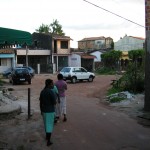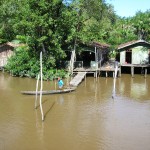Roger Cohen, a long time foreign correspondent and New York Times columnist, is delighted in the confidence he sees in the Brazilian economy — where some pizzas sell for $45 a twirl!
Let me be clear, he’s not advocating for 45 dollar pizza. Still, he is saying that Brazil, even with an overvalued currency, is rolling along on confidence, even swagger, and that is what the US needs too. He says Mr. Obama is Mr. Competence and he needs to be Mr. Confidence which he could be if our economy were stronger, not burdened by wars and in-sustainable growth for the rich.
Data seems to show that Brazil has raised some of its working poor into the middle class who, along with the rich, can afford expensive goods and drive million dollar cars. But what about the rest of Brazil?
What about the dwellers of the slums, the favelas of Rio and Sao Paulo and other cities who try to eke out a living with high unemployment.
And what of the indigenous and others who live in riverbank villages? Many will lose their homes and work because dams are being built up-river for energy use in the south of Brazil.
Is this what it takes to become a world power?
What is to become of these citizens of this great country? And who is looking out for them?
I know there are Sisters of Notre Dame de Namur there in Anapu, Dorothy’s sisters, and there are other groups of missionaries and lay people who are working to empower people throughout Brazil.
But there are also large corporate farmers and ranchers who feel entitled to take land away from small farmers and poor fisher men and women, and who celebrate the coming of greater economic success with impunity and violent actions, as they did in Dorothy’s days, not to mention the dams. Brazil can do without this kind of swagger.
And, how do the poor pay for pizza?













{ 1 comment… read it below or add one }
Thanks again, Michele for opening up new information and educating me about issues in Brazil. What impresses me most is the effort the Sisters of Notre Dame de Namur are exerting to make a difference in the lives of the impoverished.